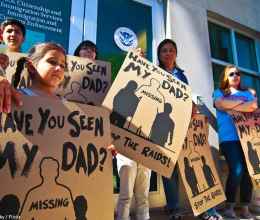
The President and the Attorney General are working hard to turn local police departments and sheriffs into branches of Immigration and Customs Enforcement (ICE). It’s a bad idea that breaks up families, harms local communities, interferes with law enforcement, and sows distrust and fear.
So we decided to do something about it.
On March 27 we sent a letter to 450 Minnesota sheriffs and police chiefs offering helpful suggestions about how to stay focused on the mission of local law enforcement without violating the law. Here’s the letter: ![]() Letter to Sheriffs
Letter to Sheriffs
We also sent model policies: ![]() Model Policies and Rules for Law Enforcement
Model Policies and Rules for Law Enforcement
What’s the problem with helping the federal government imprison and deport immigrants? Plenty.
Knuckling under to threats to withhold federal grants from municipalities and make immigration enforcement part of city and county law enforcement would be catastrophic. First, it would undermine law enforcement's ability to prioritize local needs like responding to emergencies and preventing crime. Our law enforcement officials are busy enough doing their jobs to protect us from crime. Adding this burden will suck resources from local priorities.
That’s not all. Smart and effective police and sheriffs have been working hard to establish trust and lines of communication with the communities they are charged with policing. They need cooperation so that crimes are reported, witnesses feel comfortable in appearing in courthouses, community members share information and concerns with the police, and the police are safe when they are on the street doing their jobs. None of that is going to happen if our communities view the police as part of the effort to engage in mass deportations.
But wait; there’s more. Diverting resources away from crime-fighting toward deportations is a budget-buster. Local jurisdictions are going to pay millions of dollars, not just in increased personnel and facilities costs, but also potential liability for the constitutional violations that will inevitably accompany this effort.
If local law enforcement officers are doing what ICE wants them to do, the federal government will certainly stand behind them and take care of the additional liabilities, right? No way. We have already seen what happens. The local jurisdiction does what ICE wants it to, in the process, depriving individuals of their rights under the Constitution. An individual sues for violation of his rights. Where is ICE? Nowhere to be found. The jurisdiction is on its own. Many thousands of dollars later, in both legal fees and damages paid, the local jurisdiction is licking its wounds, with not so much as a Band-aid from the federal government to show for it.
The Trump Administration has threatened to strip federal funds from jurisdictions that decline to direct local personnel and resources toward federal immigration priorities. But so far it is losing that fight. Courts have held that federal law doesn’t allow the administration to do that.
The administration is having no more success in court trying to enforce ICE detainers than the previous administration, or written requests that local law enforcement detain an individual for an additional 48 hours after they would otherwise be released. ICE detainers are typically issued without a judicial warrant supported by probable cause. As a result, extended detention violates the Fourth Amendment. Federal courts around the nation have held ICE and local law enforcement agencies liable for unconstitutional detentions under ICE detainers.
President Trump's demand that local law enforcement officers act as immigration agents puts those officers and their communities at risk. The ACLU-MN is offering is appreciative of local law enforcement if they choose to put the needs of their local communities first.


